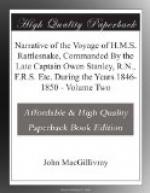As the evening came on, there came with it the painful task of removing the bodies of our unfortunate companions who had died in the morning. We had not strength to make the smallest hole in the ground as a grave; but after great exertion we succeeded in removing the bodies to a small patch of phyllanthus scrub, about four feet high, and eighty yards from the tent. We then laid them side by side, and covered them with a few small branches, and this was all the burial we were enabled to give them.
December 29.
Goddard went into the scrub, and shot three pigeons. We ate one of them at night, and the others we reserved till next day. Our bowels were greatly relaxed, which was partly stayed by eating a few nondas, which we got occasionally.
The six weeks having expired, which Mr. Kennedy had led me to expect would be the longest period we should have to wait, I now began to fear the rainy season had set in, and filled the creeks to the northward, so that his party had been unable to cross them, or that some untoward accident had happened, which prevented us being relieved.
I did not quite despair, but I knew that we could not live long. Our shot was almost consumed, not having more than eight or ten charges left, and although we had plenty of ball, we were too weak to attempt to form any plan to make shot. Our sole remaining companion, the sheepdog, I intended to kill in a day or two, but he would not last long, as he was nothing but skin and bone.
December 30.
Early this morning we ate the two pigeons left yesterday, and boiled each a quart of tea, from the leaves we had left; but we had not had any fresh tea to put into the pot for some time. Goddard then went into the bush, to try to get another pigeon or two, and if the natives made their appearance, I was to fire a pistol to recall him to the camp. After he had been gone, I saw natives coming toward the camp, and I immediately fired a pistol; but before Goddard could return they came into the camp, and handed me a piece of paper, very much dirtied and torn. I was sure, from the first, by their manner, that there was a vessel in the Bay. The paper was a note to me from Captain Dobson, of the schooner Ariel, but it was so dirtied and torn that I could only read part of it.
For a minute or two I was almost senseless with the joy which the hope of our deliverance inspired. I made the natives a few presents, and gave them a note to Captain Dobson, which I made them easily understand I wanted them to take to that gentleman. I was in hopes they would then have gone, but I soon found they had other intentions. A great many natives were coming from all quarters well armed with spears. I had given a shirt to the one who had brought the note, and put it on him; but I saw him throw down the note and pull off the shirt, and picking up his spear he joined the rest, who were preparing to attack us. We were expecting every moment to be attacked




